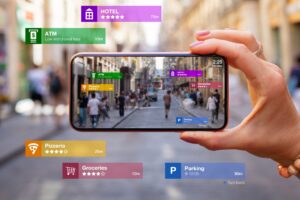Why Augmented Ads Really Click with Today’s Travelers
What is an Augmented Ad?

Sure, you’ve probably heard about augmented ads and more than likely have been exposed to them, but what is an augmented ad really? In layman’s terms, augmented ads use a digital technology known as augmented reality (AR) which changes a person’s perception of their surroundings when viewed through a device like a smartphone or tablet. Think of augmented reality as the cousin of virtual reality, however, the latter replaces one’s actual environment, whereas AR merely enhances it.
Augmented advertising has grown by leaps and bounds in many industries, especially in the travel industry. And the reason is clear. Augmented ads, augmented apps, and the like give viewers something no stagnant image can – an overall brand experience – and an engaging and interactive one at that. It also gives customers something they’ve gotten used to – information on demand. As such, augmented ads have become a vital component of today’s most successful tourism campaigns. Here we discuss a few of the ways AR really clicks with tourists.
A Tap and Go Resource
Today’s travelers are resourceful. Before selecting a getaway or a vacation destination, they do their homework. They want to absorb everything they can about their potential journey – from scanning menus from the best places to dine to a run-down on activities to do in the area. More importantly, they want to gather this information quickly and easily through their smartphone. Savvy tourism marketers have responded with augmented ads. By bringing the environment they are selling to life with informative click-tos, destinations can often sway travelers that may be on the fence about where to go.
An Engaging Bookings Booster
Ok, so the destination is selected. Next up – where to stay. Travelers aren’t booking a hotel solely on word of mouth or reviews anymore. No way. They want to experience the accommodations they’re eyeing up before they even think of stepping foot there. Hotels and resorts are smart to cater to this with 360-degree room tours and augmented images of their locale sprinkled with bursts of clickable, interactive selling points. Using AR technology in these ways can be a definite win-win – by giving the audience what they’re looking for and increasing bookings. Once guests arrive, keep the communication flowing with specific hotel AR-based apps that provide answers and helpful 24/7 information to any concern that may arise during their stay.
A Way to Explore More

What’s great about augmented technology is there are no boundaries. In the tourism realm, augmented ads and apps are not restricted to just lodging and destinations. AR can also be used to promote an entire region. Enter self-guided tours – one of the most powerful methods utilized by historic districts and museums. Users can access a series of facts as they view a significant site or landmark through their smartphone. The result is a more immersive adventure for the user and one that they are likely to recommend or repeat again.
There are many possibilities for using augmented ads in the travel sector – from promoting a region to inspiring getaways to bumping up bookings. Click with your audience and get a competitive edge with the award-winning travel and tourism marketing experts at Dana Communications. Contact Lynn Kaniper at 609.466.9187 ext. 117 or lkaniper@danacommunications.com today.